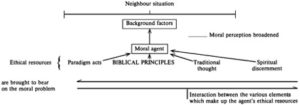The core teaching of Jesus Essay
During his time of ministry, Jesus taught many teachings through parables, proverbs, and wise sayings to his 12 disciples and the crowds that followed him wherever he went. Unlike the prophets who came before him, Jesus taught with authority (Mathew 7:29). He forgave sinners, cleansed the unclean, and performed many miracles that baffled the Pharisees and the teachers of the law. Like the prophets before him, he came with God’s divine message and purpose, to fulfill the word.
Many people including Jesus’ disciples returned to him secretly to learn the deeper meaning of his parables. Even though he eluded the Kingdom of God to things familiar to them, they could not still understand him. The core of Jesus’ teachings was on the fact that God love us and that we should love each other just as he has demonstrated his love to us.Many of other Jesus’teachings gave strength to this core teaching of love.
When Jesus’ disciples asked himof the greatest commandment, he answered them by saying, “love the Lord your God with all your heart, and with all your soul and with all you mind and with all your strength,” (Mathew 22:37 KJV). There are many instances where Jesus talked about love. First was at the mountainside. He said,
Ye have heard that it hath been said, Thou shalt love thy neighbour, and hate thine enemy.But I say unto you, Love your enemies, bless them that curse you, do good to them that hate you, and pray for them which despitefully use you, and persecute you;That ye may be the children of your Father which is in heaven: for hemaketh his sun to rise on the evil and on the good, and sendeth rain on the just and on the unjust.
For if ye love them which love you, what reward have ye? do not even the publicans the same?And if ye salute your brethren only, what do ye more than others? Do not even the publicans so? (Mathew 5:43-48).
In this teaching on the mountain, Jesus strengthened the word of God,as was his purpose for teaching. By telling the people to love their enemies, Jesus was showing them the example of God’s love to us, which we should extend to our enemies.
When the time of Jesus’ death came, as was prophesied, he still spoke to his disciples about loving each as he had loved them, “A new commandment I give unto you, that ye love one another; as I have loved you, that ye also love one another.” (John 13:34). During the time of Moses, offering of burnt sacrifices was done to appease God. The priests at the temple performed this noble task every time the wrath of God befell the nation. It was awayof cleansing the people.
According to Jesus, love was greater that burnt sacrifices. “And to love…is more than all whole burnt offerings and sacrifices.” Mark 12:33.He condemned the Pharisees and the teachers of the law who lead sinful lives and continued proclaiming the word of God and offering sacrifices in the temple. He eluded them to blind leaders of the blind. “Let them alone: they are blind leaders of the blind. And if the blind lead the blind, both shall fall into the ditch.” MATTHEW 15:14
New King James Version Bible. n.d.
- Human Rights in Catholic Teachings
- The literal meaning of the word Sikh
- Volunteering for Horizon House: Homeless Neighbours’ Motivation to Find Jobs
- The Warrior Hero: Heroic Attributes of Rustem
- "Why Sit Ye Here and Die?" Speech by Maria Stewarts
- Philosophical Concept of the Plato’s “Allegory of the Cave”
- Augustine's confessions
- Religion and Science: Similarities and Differences
- Religion on earth: A Report from an Alien Eyewitness
- Misconceptions About Buddhism
- Chicago (A-D)
- Chicago (N-B)
IvyPanda. (2018, June 13). The core teaching of Jesus. https://ivypanda.com/essays/the-core-teaching-of-jesus/
"The core teaching of Jesus." IvyPanda , 13 June 2018, ivypanda.com/essays/the-core-teaching-of-jesus/.
IvyPanda . (2018) 'The core teaching of Jesus'. 13 June.
IvyPanda . 2018. "The core teaching of Jesus." June 13, 2018. https://ivypanda.com/essays/the-core-teaching-of-jesus/.
1. IvyPanda . "The core teaching of Jesus." June 13, 2018. https://ivypanda.com/essays/the-core-teaching-of-jesus/.
Bibliography
IvyPanda . "The core teaching of Jesus." June 13, 2018. https://ivypanda.com/essays/the-core-teaching-of-jesus/.
- To find inspiration for your paper and overcome writer’s block
- As a source of information (ensure proper referencing)
- As a template for you assignment
IvyPanda uses cookies and similar technologies to enhance your experience, enabling functionalities such as:
- Basic site functions
- Ensuring secure, safe transactions
- Secure account login
- Remembering account, browser, and regional preferences
- Remembering privacy and security settings
- Analyzing site traffic and usage
- Personalized search, content, and recommendations
- Displaying relevant, targeted ads on and off IvyPanda
Please refer to IvyPanda's Cookies Policy and Privacy Policy for detailed information.
Certain technologies we use are essential for critical functions such as security and site integrity, account authentication, security and privacy preferences, internal site usage and maintenance data, and ensuring the site operates correctly for browsing and transactions.
Cookies and similar technologies are used to enhance your experience by:
- Remembering general and regional preferences
- Personalizing content, search, recommendations, and offers
Some functions, such as personalized recommendations, account preferences, or localization, may not work correctly without these technologies. For more details, please refer to IvyPanda's Cookies Policy .
To enable personalized advertising (such as interest-based ads), we may share your data with our marketing and advertising partners using cookies and other technologies. These partners may have their own information collected about you. Turning off the personalized advertising setting won't stop you from seeing IvyPanda ads, but it may make the ads you see less relevant or more repetitive.
Personalized advertising may be considered a "sale" or "sharing" of the information under California and other state privacy laws, and you may have the right to opt out. Turning off personalized advertising allows you to exercise your right to opt out. Learn more in IvyPanda's Cookies Policy and Privacy Policy .

- Free Courses
- Social Media
- Online Courses
- Course Bundles
- Courses Login
- NINT Conference
- Consulting & Editing
- Book Bart to Speak
- Bart’s Biography
- Books Published
- Curriculum Vitae
- BART’S BIOGRAPHY
- CURRICULUM VITAE

Teachings of Jesus: 10 Messages Jesus Really Taught

Written by Joshua Schachterle, Ph.D
Author | Professor | Scholar
Author | Professor | BE Contributor
Verified! See our editorial guidelines
Verified! See our guidelines
Edited by Laura Robinson, Ph.D.
Date written: February 19th, 2024
Disclaimer: The views and opinions expressed in this article belong to the author and do not necessarily match my own. - Dr. Bart D. Ehrman
It’s common today for the tenets of Christianity to be distilled down to who Jesus was believed to be (Son of God, Messiah) rather than what he taught. Some would blame Paul the Apostle for this, since he spent far more time in his authentic letters on the importance of Jesus as Messiah than on Jesus’ actual words.
Whatever the case, scholars know that Jesus was undeniably a teacher during his lifetime . In order to understand the historical Jesus , then, it makes sense to look at the teachings of Jesus.

What Are Our Sources for the teachings of jesus?
In this article, I’m going to stick to the Synoptic Gospels as sources for Jesus’ teachings. Why?
First of all, our earliest written Gospel is Mark. Scholars therefore count on Mark, since it is closest to Jesus’ life, as containing more early traditions about Jesus’ sayings than later writings. In addition, we also know that both Matthew and Luke used Mark as a source.
The Gospel of John , on the other hand, while fascinating in so many ways, is not a great source for Jesus’ teachings as most scholars will agree. John, like the letters of Paul, is about Jesus’ identity far more than Jesus’ teachings. In John, Jesus spends most of his time talking about who he is – the “I am” sayings – rather than teaching what his followers should do. In this way, it differs significantly from the Synoptics.
New Testament scholar James Dunn puts it this way:
It is a striking fact that these ‘I am’ sayings appear only in the Fourth Gospel. It is almost impossible to believe that there were such sayings in the Jesus tradition, sayings that Jesus was remembered as uttering about himself, and yet all three synoptic evangelists ignored them completely.
All this points to the fact that we have a much better chance at getting to Jesus’ authentic teachings through the Synoptic Gospels , many of them included in discourses like the Sermon on the Mount.
In addition, all the teachings I include here can probably be linked to Jesus because, as Irving Zeitlin has noted, they fit well within the context of 1st-century Judaism. Jesus was a committed Jew and as such, his teachings had to fit that context. That’s why, for example, Jesus tells his followers in Matthew 5 that they must follow the Torah, the Jewish law, even more zealously than other Jewish groups such as the Pharisees or Sadducees.
How Did Jesus Teach?
One thing scholars know about the teachings of Jesus was that he often taught in parables . If you’re not familiar with the term, a parable is a simple teaching story which often employs metaphorical analogies to get its point across. There are many examples in the New Testament like this one from Matthew 13:
Again, the kingdom of heaven is like a merchant in search of fine pearls; on finding one pearl of great value, he went and sold all that he had and bought it.
This parable makes the point that nothing is more important than living according to the ideals of the Kingdom of Heaven, also called the Kingdom of God .
Jesus also used short, pithy sayings which the Gospel writers embedded in mini-dialogues called chreiai (singular: chreia). Here’s an example from Mark 13:1-2:
As he came out of the temple, one of his disciples said to him, “Look, Teacher, what large stones and what large buildings!” Then Jesus asked him, “Do you see these great buildings? Not one stone will be left here upon another; all will be thrown down.”
I should also point out that all of Jesus’ teachings can be placed under the umbrella of his proclamation that the Kingdom of God is coming soon . This meant that God would soon take charge of the world after punishing the wicked people who had been in charge for so long. The righteous, who lived according to the ideals of the Kingdom, would be saved and have a place in God’s Kingdom.
Having established Jesus’ teaching methods, let’s look at 10 essential teachings that scholars believe came from the historical Jesus (in no particular order).
FREE COURSE!
WHY I AM NOT A CHRISTIAN
Raw, honest, and enlightening. Bart's story of why he deconverted from the Christian faith.
Over 6,000 enrolled!
1. Don’t Worry
In Matthew 6:25-34, Jesus tells his listeners not to worry about their needs, including food and clothing, because God will provide for them. He refers to nature as an illustration in this section:
Look at the birds of the air: they neither sow nor reap nor gather into barns, and yet your heavenly Father feeds them. Are you not of more value than they? And which of you by worrying can add a single hour to your span of life? And why do you worry about clothing? Consider the lilies of the field, how they grow; they neither toil nor spin, yet I tell you, even Solomon in all his glory was not clothed like one of these. But if God so clothes the grass of the field, which is alive today and tomorrow is thrown into the oven, will he not much more clothe you—you of little faith?
The message is clear: those who live out the ideals of the Kingdom must believe that God, as the righteous king, will always care for the people in his Kingdom. Therefore, they should seek first the kingdom of God and his righteousness, and all these [material] things will be given to you as well.
2. Love Your Enemies
In Matthew 5:43-45, Jesus says
You have heard that it was said, ‘You shall love your neighbor and hate your enemy.’ But I say to you: Love your enemies and pray for those who persecute you, so that you may be children of your Father in heaven, for he makes his sun rise on the evil and on the good and sends rain on the righteous and on the unrighteous.
Notice that loving one’s enemies is following the example of God. If you’re unaware of the context in which Jesus is preaching, you might think that his rain/sun statement means that God gives good and bad things to everyone.
However, Jesus is preaching in rural Galilee, where most people were subsistence farmers. In that context, both sun and rain were necessary and good. Jesus is saying, then, that people should treat everyone with kindness, whether they are righteous or not.
3. The Golden Rule
Matt 7:12 gives us a form of what has become known as the Golden Rule. By the way, this idea exists in most religions and can certainly be found in Judaism before Jesus.
In everything do to others as you would have them do to you, for this is the Law and the Prophets.
Speaking of Judaism, it’s interesting to note that Jesus says that the Golden Rule is basically a distillation of the entire message of the Hebrew Bible. A later saying, attributed to the famous 1st- century rabbi Hillel in the Talmud echoes this idea:
What is hateful to you, do not do to your neighbor. That is the whole Torah; the rest is the explanation of this—go and study it!
4. Love God
In Matthew 22:37-38, a Torah expert approaches Jesus and asks,
“Teacher, which commandment in the law is the greatest?” [Jesus] said to him, “ ‘You shall love the Lord your God with all your heart and with all your soul and with all your mind.’ This is the greatest and first commandment.
Loving God, presumably by acting out the ideal behaviors of God’s Kingdom, is the most significant thing to focus on throughout one’s life. The other is…
5. Love Your Neighbor
Jesus speaks about caring for others in Mark 12:31, saying “Love your neighbor as yourself.” Bart Ehrman points out that this is actually a fairly revolutionary idea in the ancient world. He notes that for Greco-Roman philosophy, the ideal was happiness and/or well-being. However, Jesus’ ethic says “You feed, clothe, and house yourself. You are to do the same for others. Give to those who are in need. Even if it requires a personal sacrifice.”
It may sound strange to us, but that idea was virtually unprecedented in Greco-Roman thought as an ideal. Acting out this altruism, Jesus said, was necessary if one wanted to enter God’s Kingdom.

Along with the idea of caring for others, in Matt 6:14-15, Jesus required people to forgive those who wronged them. After teaching the disciples the Lord’s Prayer, which includes the notion of forgiveness, Jesus says
For if you forgive others their trespasses, your heavenly Father will also forgive you, but if you do not forgive others, neither will your Father forgive your trespasses.
Since God forgives every kind of sins, his followers must also forgive everyone’s sins if they want a place in God’s Kingdom. This is part of the price of admission.
7. Eye of a Needle
In this saying from Mark 10:25, Jesus takes a hardline stance toward wealth:
It is easier for a camel to go through the eye of a needle than for someone who is rich to enter the kingdom of God.
Why such a harsh attitude toward the rich? Remember, Jesus’ ethics are geared toward living out the ideas of the Kingdom of God. This includes caring for and giving to others in need . Being wealthy, on the contrary, is about fulfilling one’s desires without concern for distributing it to others. It is therefore the opposite of the life of the Kingdom.
8. Humility and Service
In Mark 9:35, Jesus “sat down, called the twelve, and said to them, ‘Whoever wants to be first must be last of all and servant of all.’ In other words, you must put others before yourself in order to be considered worthy of the Kingdom of Heaven.
9. Peacemakers
Going along with humility, in Matthew 5:9 Jesus says, “Blessed are the peacemakers, for they will be called children of God.” Yes, this means those who help to pacify conflicts between others, but it surely also includes avoiding conflicts between oneself and others as well.
Toward this end, in Matthew 5:39-40, Jesus also says
Do not resist an evildoer. But if anyone strikes you on the right cheek, turn the other also, and if anyone wants to sue you and take your shirt, give your coat as well.
Why is it important not to engage in conflict with others? For the same reason that all of these teachings are important to Jesus: this is how the Kingdom of God operates. When you love and care for your neighbor, you refuse to hurt anyone ever, even if they are actively hurting you.
It’s interesting to note that both Gandhi and Martin Luther King Jr. were inspired by these teachings.
10. Let your light shine
For our last teaching of Jesus, let’s look at Matthew 5:16:
You are the light of the world. A city built on a hill cannot be hid. People do not light a lamp and put it under the bushel basket; rather, they put it on the lampstand, and it gives light to all in the house. In the same way, let your light shine before others, so that they may see your good works and give glory to your Father in heaven.
This light Jesus refers to is one’s example. He is saying that if each of his followers act out these ideals of the Kingdom, people will see what a wonderful world is coming and may decide to join in , acting out the same ethics, all of which would build toward the coming Kingdom of God.
All of the authentic teachings of Jesus were focused on one thing: the advent of the Kingdom of God, the intervention of God into the sinful world in order to establish a peaceful kingdom of and for the righteous.
To that end, Jesus taught that people must care for each other, even more than they care for themselves. This included being humble and generous, not hoarding wealth or tooting one’s own horn. It also included treating others, even enemies, with kindness and refusing to engage in conflict with others.
All of these teachings showed one’s love for God and that one was worthy to be part of God’s kingdom, the very thing which Jesus saw as his life’s mission.
Josh Schachterle
About the author
After a long career teaching high school English, Joshua Schachterle completed his PhD in New Testament and Early Christianity in 2019. He is the author of "John Cassian and the Creation of Monastic Subjectivity." When not researching, Joshua enjoys reading, composing/playing music, and spending time with his wife and two college-aged children.
Best Bible Resources For Christians
- Bible Facts
- Christian Life
- Read the Bible
Home > Christian Resources > What Are The Core Teachings of Jesus

Christian Resources
What Are The Core Teachings of Jesus
Modified: January 9, 2024
Written by: Ronald Rentner
Jason DeRose, Managing Editor at Christian.net, uses his expertise in religion and journalism to deepen understanding of faith's societal impacts. His editorial leadership, coupled with a strong academic background, enriches the platform’s diverse content, earning him recognition in both journalism and religious circles.
The teachings of Jesus reveal the core principles & discipline in living the Christian life. Know the heart of Jesus through his teachings.
- Christ's teachings
- core teachings of Jesus
- Forgiveness
- judging others
- love your enemies
- love your neighbor
- teachings of Jesus
(Many of the links in this article redirect to a specific reviewed product. Your purchase of these products through affiliate links helps to generate commission for Christian.net, at no extra cost. Learn more )
The first four books of the New Testament called the Gospels or “good news” tell us the most significant stories of the Bible and historical facts- the life, ministry, and teachings of Jesus Christ. The four Gospels namely Matthew, Mark, Luke, and John are written from different and unique perspectives. Nevertheless, the teachings and life of Jesus depicted in each Gospel supports and complements each other. It gives us an overall and complete picture of Christ’s life and his characteristics as a teacher. Jesus ministered on earth for about three years. And in those years, multitudes went to listen, follow, and learn from him whenever and wherever he ministered. These teachings cover the most important subjects in life. It influenced and changed millions of lives; still remaining powerful today despite the 2,000-year gap after Christ’s death and resurrection.
If the teachings of Jesus survived for more than two thousand years and its influence stays the same, it means the wisdom of these teachings remains to be the greatest in history. With Christ’s numerous topics from sermons to parables, it is difficult to choose what His primary teachings are. Besides, all the teachings of Jesus matter, for they impact lives in the past, present, and will continue to do so in the future. His lessons in his ministry are all profitable for teaching, rebuking, correcting, and for training in righteousness (2 Timothy 3:16). The core teachings of Jesus summarized here focuses on the instructions of Jesus while He was on earth.
Love God: The Greatest Commandment
Mark 12: 28-30.

When a scribe asked Jesus which commandment is the most important of all, Jesus answered that it is to love God. Yet, the next phrases of Jesus might overwhelm anyone the first time one hears about it. Jesus said we are to love the Lord our God with all your hearts, with all your souls, with all your minds, and with all your strength (Mark 12:30 – 31). This verse is interesting because the phrases are specific, emphasizing the very need to love God with our entire being. And that is what the greatest commandment; to love God with our whole being. God seeks people to love Him with all that they are.
Not only does God loves us more than enough, but He gives us everything we need every day, even giving His one and only begotten Son for the salvation of mank ind. In knowing and experiencing the love God has for us, can’t we love Him by giving our entire being to Him too? Indeed, we can only love God because He first loved us (1 John 4:19).
Read more : What Are The Teachings Of Jesus Christ
With All Your Heart
The soul, mind, heart, and strength represent different parts of our being. Loving God with all our heart refers to our love for God with our will and rational capacity. The heart is the core of man’s being. Thus, we are to love God from within. Loving God with all our heart means that we desire and decide to love him with all that is within us.
The Bible tells us that from the heart flows the spring of life (Proverbs 4:23). It is where life starts. Everything that we do flows from it. Out of the abundance of the heart, the mouth speaks (Luke 6:35). Furthermore, it says that the good person out of the good treasure of the heart produces good, and the evil person out of evil treasure produces evil. Notice that whatever we do on the outside is a manifestation of what we store on the inside. Therefore, our love for God should start from our core, deep within us so that this love inside can overflow outside through our words and actions.
With All Your Mind
Loving God with all our minds is all about our intellectual love for Him. We do not talk about just an intellectual consciousness of who God is nor of the knowledge of our love for Him. When our mind desires God, when we constantly have Him in our thoughts, and we continuously try doing what we hope would please Him, this is what it means to love God with our entire mind. When we love God, we seek to know Him more and to know His Word. Philippians 4:8 advises us to think about things that are true, honorable, just, pure, lovely, commendable, excellent, and praiseworthy.
With All Your Soul
The soul signifies life. It may represent our capacity to love emotionally. The Bible usually uses the soul in denoting feelings and emotions. For example in Psalm 42:11, it says “Why are you cast down oh my soul, and why are you in turmoil within me?” The Lord designed us to be emotional beings so that we not only have an understanding of His love for us but also to feel it, experience it that we may also have the same emotional capacity to love God.
With All Your Strength
To love God with all our strength means that we are to love Him with our physical capacity. The Lord gave us the physical attributes, talents, and strength so we can use it in giving honor to His name. Our physical body allows us to serve Him. Our love for God should be filled with fervor and energy because it springs from willingness and passion. Whatever love our heart, soul, and mind have, it manifests itself physically. Therefore, we are to love God with all of our being.
Read more : What Did The Apostles Teach
Love Your Neighbor
Mark 12:31-33.

The second greatest commandment which is undeniably the most important teaching of Jesus towards others is to love your neighbor as yourself. An expert of the law, a Pharisee, who asked Jesus about the greatest commandment agreed when Jesus spoke about loving God and loving your neighbor as yourself. Moreover, the pharisee added that loving God and loving your neighbor is more important than all burnt offerings and sacrifices. What was Jesus’ reply to this? The Lord said that this Pharisee was not far from the kingdom of God.
Loving our neighbor is somehow manageable. One can do it without much hard work. However, loving our neighbor as to how we love ourselves will require us more effort, patience, and understanding. If we love our neighbors with the same love we have for ourselves, there is no room for selfish acts. Furthermore, there is no way we can regard ourselves as someone higher than anyone else.
As a test, another expert of the law asked Jesus about how a man can inherit eternal life, and again, the discussion led to the two greatest commandments love God and love your neighbor. The Pharisee asked Jesus in a tenacious attempt of trying to prove himself with this question “who is my neighbor?” Jesus answered this Pharisee with the parable of the Good Samaritan.
The Parable of The Good Samaritan
Luke 10:25-37
Of the many teachings of Jesus, this becomes one of the most popular parables in the Bible. It tells the story of a Samaritan who helped a man who was stripped off by robbers, beaten, and left half-dead on the road. A priest and a Levite saw the man but did nothing. But when a Samaritan saw the man, he had compassion on him and helped him.
This parable tells us of our accountability with one another no matter who we are. Remember, it was the Samaritan who helped the man, not the priest or the Levite who both serves in the Holy Temple. The Jews loathe the Samaritans during this era. They considered them as outcasts for they defile the Jewish religion by living with pagans. The Jews and Samaritans disliked and opposed each other greatly. Yet, the Good Samaritan in the story helped the Jewish man who most likely hated him for his origin. Who is our neighbor then? Everyone, even those whom we hate, even those we don’t know, and even those who hate us.
Today, people refer to a Good Samaritan as someone who does random acts of kindness towards others usually in a form of charity, generosity or simply helping out. The Good Samaritan in the parable doesn’t know the man, but he knows the man needs help. Like the Samaritan, we should help and love each other; our neighbors.
The Teachings of Jesus Tells Us: Forgive Seventy-Seven Times
Matthew 18:21-22.

In the Jesus’ disciples was probably thinking seven times was more than enough times he should be required to forgive someone. With this idea, he asked Jesus ‘Lord, should I forgive as many as seven times?’ Peter must have thought that seven times of forgiveness will please the Lord. But the number Peter gave was so invaluable compared to the answer Jesus gave. After all, seventy-seven was just a number for a metaphor of forgiving endlessly. The Lord desires that we forgive without limit, as long as we live.
The number seven in the Bible often represents completion. The Lord created the earth for six days and rested on the seventh day. It tops the list of the most used and most significant numbers in the Scripture. Hence, Jesus wants that we forgive completely. Forgiving completely means that we won’t hold any grudges anymore. It means that we are going to forget the pain caused by other people and set our hearts free from hatred and resentment. For Peter and the other disciples to understand what Jesus was trying to say when He said they should forgive seventy-seven times, He tells the parable of a servant who refused to forgive.
The Parable of The Unforgiving Servant
Matthew 18:23-25
This parable tells the story of a servant who owed his master ten thousand talents. The servant couldn’t pay his debt so his master ordered him to be sold, with his wife and children and all that he had. But the servant begged his master to give him more time to repay his debt. Out of mercy his master released and forgave his debt. Thus, all his debt was no more, he’s free. But, when this servant saw his fellow servant who owes him a hundred denarii, he choked him and forced him to pay his debt. When his fellow servant pleaded with him, he refused to forgive his debt. Instead, he put him in prison. When this servant’s master found out, he became angry for he had forgiven this servant who didn’t show mercy to another for the same reason. So, the master put him in prison too, until he could pay all his debts.
Now, it’s important to understand how big the difference is between a hundred denarii and ten thousand talents. According to scholars, a hundred denarii is almost equal to a four-months wage. However, the ten thousand talents debt of the unforgiving servant will take him more than his lifetime to be able to pay it. To earn one talent, you will have to work for around 15-20 years. That is just one talent! How long would it take for the servant to pay ten thousand talents? Even the entire time of his life will not be enough. This is the reason why it will take his wife, children, and everything that he has as payment. Because God has forgiven all our sins, we shouldn’t withhold forgiveness from others. When we are unforgiving, we’re only harming our futures.
The Key to Forgiveness
What can we learn from this parable? Unless we truly receive the complete forgiveness of Jesus, we cannot also extend the same forgiveness to others.
How can we not forgive if we who have sinned greatly have received forgiveness freely? If our debts have been canceled, there’s no reason left not to forgive others as well. The warning of Jesus in this parable should wake us up. If we do not forgive others, how can the Lord forgive us? The forgiveness of Jesus is free and the world needs it. If you still hold grudges or resentment against your brother, seek God’s forgiveness and power to enable us to forgive.
Read more : What Were The Most Important Teaching Of Christ Jesus
Judging Others
Luke 6:37-42.

The teachings of Jesus also teaches us about the principle of measurement. In Luke 6:38 Jesus said, “For with the measure you use, it will be measured to you.” Jesus instructs us with a simple statement. The statement is this: “Judge not, and you will not be judged. Condemn not and you will not be condemned.” Though these may seem like simple directions to follow, the latter part of the teachings of Jesus regarding judgment will reveal to us how this is not a simple instruction.
It is easy to overlook the sin of judgment especially if you’re inside the church. Sometimes, this sin clothes itself with false concern towards others. We judge hastily thinking that we’re doing the right thing. If we feel like we are doing good deeds and see others doing evil, pride enters our hearts and we start to question them and condemn them. We may then have thoughts like, “Thank God, I am not as sinful as them” or “The Lord should curse them, they are evil.” These are dangerous traps. Simple ideas like ‘we are better than others’ or if you always see the mistakes and flaws of others but can’t see yours — this is just us as much danger.
In the teachings of Jesus about judging others, we are reminded to take out the speck that is in our eye before we try to remove the specks out of our brother’s eyes. This is perilous because Jesus said a blind man cannot lead another blind man. They will both fall into a pit. Imagine a place full of people who try to judge others without looking at themselves? Can they see the truth? No. And they will all fail.
The Teachings of Jesus Shows How To Love Your Enemies
Luke 6:27-36.

Loving our neighbor is already difficult. How much harder could loving our enemies be? The teachings of Jesus surprise us with wisdom that is at first glance too hard to accomplish. We hate our enemies. They disgust us. We resent them. They irritate us. We fight them. In worse cases, hatred happens with a physical scuffle. Undeniably, it causes us emotional distress which affects other aspects of our life. There is just no way we can easily love our enemies. It is easy to love a stranger than to love someone whose past shares a glitch in our relationship. However, the teachings of Jesus instruct us that we love our enemies. The Lord explains the importance of loving our enemies in the Gospels.
In the Book of Luke, Jesus taught about how there is nothing remarkable about loving those who loved us already. Jesus must be saying to his disciples “C’mon! all men do that. What’s new to that?” Loving those easy to love is no remarkable act. The students of the teachings of Jesus cannot find distinction just by doing that. Jesus asked them, “If you love those who love you what benefit is that to you?” Furthermore, if we will only do good to those who do good to us, what benefit is that to us? Even sinners do this.
What God then is trying to say? You show love to people who don’t deserve it. Do good to people who cannot return it. Be kind and merciful and loving even to those you hate and even to those who sin against you. Jesus wants us to emulate His very own character— merciful, loving, and kind. In the last section of these teachings of Jesus, the Lord commands us to be merciful as he is merciful.
Lay Up Treasures in Heaven
Matthew 6:19-24.

The teachings of Jesus always lead us to attain things that are eternal and not just for temporary pleasure. Temporal things will teach us to do what we like and what we believe in without consulting Scripture. Of course, life is a lot easier without following any rules. But the Bible tells us that is not life. In all the teachings of Jesus, this one about laying up treasures in heaven is not as popular compared to the previous teachings of Jesus mentioned earlier. Yet, this teaching is of vital importance. It shows us how we should live on earth. In the same way, it shows the sovereignty of God in our lives. Knowing that God is sovereign should lead us further into following the teachings of Jesus.
There are just two things which the teachings of Jesus tell us regarding where we should store our treasures. First, it is not here on earth. It shouldn’t be here. Second, the only place where we should lay up our treasures is in heaven. Nothing is permanent in this world. Money and gold will perish. Uncertainties are present all the time. We don’t know what could happen. Nonetheless, it is not a bad thing to save money, this is necessary for survival in this world, but the treasure God is speaking about is not money.
Jesus said for where your treasure is there your heart will be also. The Lord is not talking about a simple investment. He is speaking about our hearts. Where is our heart directed? What is inside of it? Are we spending our lives trying to earn and earn money and life becomes just about that? If you have come to this kind of living, we better look at this parable.
The Parable of The Rich Fool
Luke 12:13-21
This is the story of a rich man who becomes so confident in his wealth and harvest that he spends his days thinking of all the ways to get more out of his grains and barns. This rich man had everything planned for his future. Since he has everything that he needs he said to himself, “Soul, you have enough goods, relax, eat, drink, and be merry.” He must have been so proud of what he accomplished that he can imagine himself doing what he wants, having fun for he has more than all he needs. He can buy whatever, eat whatever, he can do anything. It was no fun that night though. The Lord took his life and everything that he prepared was all in vain now.
This is how useless our toils are if we fail to recognize the purpose of life. Treasures here on earth are futile. Money can’t give us eternal life in heaven where gold and silver are just adornments. The teachings of Jesus warn us about how impossible it is to serve two masters. We cannot serve both God and money (Matthew 6:24). If we store treasures here on earth that means we let the money rule us and we aren’t putting God first. There are other ways we lay up treasures here on earth such as in the form of fame, idols, or possessions. These are things that are temporary. The way we invest in heaven is by pursuing Christ, the teachings of Jesus, God’s Word, and His will. If we let Him govern all our temporary treasures, we don’t have to worry for He will be with us.
Read more : What Do Gospels Teach Us
Follow The Teachings of Jesus
The core teachings of Jesus should inspire us to live under the grace of God and not by our own might. He cannot allow us to do the things He has not given us first. The focal subject of the teachings of Jesus centers on love. It is no wonder for it is utterly the essence of God’s character. There is no easy way to obey the teachings of Jesus but we as Christians should follow the example of Jesus. Following Christ and His teachings is not a one-man journey. He gave us people to help us, to remind us, and even to correct us. Jesus also promised that he would show us the way to avoid temptation that will come unto us. Aside from these are the other promises of Jesus that He will supply us with courage, wisdom, and strength.
These core teachings of Jesus are just a few of the striking statements, parables, and instructions of Jesus during his three-year ministry here on earth. True Christians adhere to the teachings of Jesus. Although this may not be an easy walk as Jesus stated, the gate that leads to life is narrow (Matthew 7:13-14) may we continue to press on toward the goal of our salvation.
Was this page helpful?
How Dale Partridge Built Relearn.org to Strengthen Theological Literacy

What Is A Synod In The Lutheran Church
Why Don't We Use The Word "Alleluia" In Lent?
What Is Emergency Baptism? When And How Is It Administered?
What Tribes Did The 12 Apostles Come From
Latest articles.
What Color Represents Catholicism
Written By: Ronald Rentner
Who Owns Notre Dame Cathedral In Paris?
How Does The First Amendment Separate Church And State?
Who Is Antipas In The Book Of Revelation
How To Get To St. Peter's Basilica From Vatican Museum
Related post.

By: Karen Herndon • Christian Resources

By: Andy Reece • Christian Resources

By: Daniel Gallik • Christian Resources

By: Susan Kearney • Christian Resources

By: Taylor McKittrick • Christian Resources

By: Mary Hughes • Christian Resources

By: Kor Adana • Christian Resources

Please accept our Privacy Policy.
CHRISTIAN.NET uses cookies to improve your experience and to show you personalized ads. Please review our privacy policy by clicking here .

- Privacy Overview
- Strictly Necessary Cookies
This website uses cookies so that we can provide you with the best user experience possible. Cookie information is stored in your browser and performs functions such as recognising you when you return to our website and helping our team to understand which sections of the website you find most interesting and useful.
Strictly Necessary Cookie should be enabled at all times so that we can save your preferences for cookie settings.
If you disable this cookie, we will not be able to save your preferences. This means that every time you visit this website you will need to enable or disable cookies again.

Bible Lift – Nourishing Faith & Understanding
Elevating Your Spiritual Journey with Insightful Bible Studies

- What Are the Key Teachings of Jesus in the Bible?
Unlocking the Wisdom of Jesus: Exploring the Key Teachings in the Bible
Welcome to a journey through the heart of one of history’s most influential figures: Jesus of Nazareth. Whether you’re a lifelong Christian, someone exploring spirituality, or simply curious about the profound impact of his teachings, this article invites you to delve into the rich tapestry of wisdom woven throughout the New Testament. Jesus spoke in parables and proclamations, sharing messages that resonated with the souls of his time and continue to inspire countless lives today. From love and forgiveness to humility and compassion, his teachings offer timeless guidance in our modern world. So, grab a comfy seat, and let’s embark on a discovery of the key principles that not only shaped a faith but also illuminate our paths in everyday life.
Table of Contents
Exploring the Heart of Love: Jesus’ Command to Love One Another
At the core of Jesus’ teachings lies a profound directive: to love one another. This command transcends time and culture, urging humanity to foster relationships rooted in empathy, compassion, and kindness. Jesus exemplified this love through His interactions—embracing strangers, healing the sick, and forgiving sinners. His parable of the Good Samaritan serves as a remarkable illustration, challenging societal norms and prompting us to reach out to those in need, irrespective of their background. The essence of this lesson is that love is not merely a feeling but a conscious choice that manifests in actions and intentions.
In the Sermon on the Mount, Jesus elaborates on this command with teachings that further illustrate how love should permeate every aspect of life. He encouraged followers to:
- Show kindness to enemies: This radical notion emphasizes loving those who may not reciprocate, expanding the definition of love to encompass forgiveness and understanding.
- Perform acts of charity discreetly: Encouraging humility in giving highlights that true love takes pleasure in serving without seeking recognition.
- Practice patience and tolerance: Emphasizing the importance of maintaining harmonious relationships even in challenging situations.
The depth of Jesus’ command invites each of us to consider how we can embody this principle daily, transforming our communities and ultimately, the world, into a reflection of His love.

The Power of Forgiveness: Embracing Grace in Our Lives
Forgiveness is a transformative act that lies at the heart of Christ’s teachings. It invites us to release the burden of resentment and opens our hearts to healing. When we forgive, we not only extend grace to others but also to ourselves, allowing love and compassion to thrive in our relationships. The essence of forgiveness is beautifully illustrated in the parable of the Prodigal Son, where despite the son’s wayward choices, the father welcomes him back with open arms. This profound message teaches us that no matter how far we stray, there is always a path back to grace and understanding.
By embracing forgiveness, we acknowledge that we are all flawed human beings in need of mercy. It encourages a culture of empathy and reconciliation, reminding us that even in our darkest moments, there is hope for redemption. Here are some compelling reasons to embrace forgiveness in our daily lives:
- Restores Relationships: Forgiveness mends the bonds strained by conflict.
- Promotes Healing: Letting go of grudges frees emotional energy, fostering inner peace.
- Cultivates Compassion: It encourages understanding and acceptance of others’ imperfections.

Living with Purpose: Jesus’ Teachings on Service and Humility
At the heart of Jesus’ teachings lies a profound call to service and humility, acting as a guiding light for believers. He emphasized the significance of serving others as a reflection of one’s love for God. In his teachings, he illustrated this through parables and actions, teaching that greatness in the Kingdom of Heaven is not about power or status, but about elevating others. Some key points include:
- Foot Washing: Jesus washed the feet of his disciples, underscoring that true leadership is found in serving those around us.
- The Good Samaritan: This parable highlights compassion and the imperative to help others, regardless of societal boundaries.
- Giving to the Needy: His teachings encourage selfless acts of charity, emphasizing that what we do for the least of our brethren, we do for Him.
Humility is intertwined with service; Jesus taught that a humble heart is a prerequisite to true greatness. He challenged societal norms by associating with the marginalized and by demonstrating that the meek will inherit the Earth. Believers are called to embody this spirit of humility through their actions and attitudes. Consider the following ways humility is portrayed in Jesus’ messages:
| Serving Others | Mark 10:45 – “For even the Son of Man did not come to be served, but to serve.” |
| Selflessness | Matthew 5:5 – ”Blessed are the meek, for they will inherit the earth.” |
| Love for Neighbors | Luke 10:27 – “Love your neighbor as yourself.” |

Faith That Moves Mountains: Building Trust and Resilience in Daily Life
At the heart of Jesus’s teachings lies an unwavering call to love and compassion. He emphasized the importance of treating others with kindness, reminding us that our relationships are reflections of our faith. Love your neighbor as yourself is a cornerstone that sets the tone for our interactions. Furthermore, Jesus urged us to extend our hearts to those who are marginalized, teaching us that true strength lies in vulnerability and kindness. This radical love fosters deep trust both in ourselves and in our communities, building resilience against the storms of life.
In addition to love, Jesus imparted essential lessons about faith and perseverance. He often used the metaphor of a mustard seed to illustrate that even the smallest amount of faith can lead to monumental changes. This idea challenges us to cultivate our beliefs, to nourish them, and to act upon them daily. In doing so, we learn to overcome fear, doubt, and adversity. Here are key teachings that encapsulate this spirit:
- Forgiveness: Let go of grudges to free yourself and others.
- Humility: Recognize that we are all equal in the eyes of God.
- Service: Serve others selflessly to find true purpose.
By integrating these principles into our everyday lives, we foster a faith that not only sustains us but also empowers those around us, creating a community anchored in trust and resilience.
Q&A: Exploring the Key Teachings of Jesus in the Bible
Q: What are the foundational themes of Jesus’ teachings? A: Jesus’ teachings often revolve around love, compassion, forgiveness, and humility. At the heart of His message is the commandment to “love your neighbor as yourself.” He invited everyone, regardless of background, to experience God’s unconditional love.
Q: How does Jesus define love? A: Jesus redefined love not just as an emotion but as a profound action. He taught that love is selfless, sacrificial, and practical. Remember His words in John 15:13? “Greater love has no one than this: to lay down one’s life for one’s friends.” This illustrates the depths to which love can go.
Q: What role does forgiveness play in Jesus’ teachings? A: Forgiveness is a cornerstone in Jesus’ message. He emphasized not just the importance of forgiving others, but also the necessity of seeking forgiveness ourselves. His parable of the unforgiving servant (Matthew 18:21-35) vividly illustrates that we should extend the same mercy to others that God extends to us.
Q: How does Jesus approach the concept of humility? A: Jesus flipped the script on humility. Instead of seeking power or status, He demonstrated that true greatness comes through serving others. In Matthew 20:26-28, He taught, “Whoever wants to become great among you must be your servant.” This teaches us that leadership is about lifting others up, not putting ourselves above them.
Q: What does Jesus teach about faith and belief? A: Jesus encourages a deeply personal faith. He invites us to trust in Him and His teachings wholeheartedly. In John 14:1, He reassures us, “Do not let your hearts be troubled. You believe in God; believe also in me.” Faith, for Jesus, is not merely about belief but an active relationship with God.
Q: How does Jesus address the topic of justice? A: While advocating for love and compassion, Jesus also champions justice. He often spoke out against oppression and inequality, calling out hypocrisy and reminding us of our responsibility to care for the marginalized. His emphasis on justice can be seen in His teachings about the Good Samaritan and the need to defend the vulnerable.
Q: Is there a specific teaching of Jesus that you think is especially relevant today? A: Absolutely! The teaching of loving our enemies (Matthew 5:44) feels extremely relevant in today’s divisive world. Jesus challenges us to rise above hatred and discord, offering a path to understanding and reconciliation. It’s a radical call to unity amidst differences.
Q: How can we apply Jesus’ teachings in our daily lives? A: Great question! Applying Jesus’ teachings can start with simple acts of kindness—holding the door open for someone, listening without judgment, or extending forgiveness to someone who has wronged us. It’s all about cultivating a heart that echoes His love and grace in every interaction.
Q: Are Jesus’ teachings still significant in contemporary society? A: Absolutely! The ideals of love, forgiveness, service, and justice resonate today. They offer a moral compass and a way to navigate the complexities of modern life. Jesus’ teachings inspire us to build communities rooted in compassion and hope, which are more vital than ever in our fast-paced world.
Q: Where can readers explore more about Jesus’ teachings? A: The best place to start is the Gospels—Matthew, Mark, Luke, and John. They are filled with the words and actions of Jesus that beautifully capture His essence. Additionally, there are many commentaries and resources available that explore these teachings in depth, making them accessible and applicable to our lives.
Feel free to reach out if you have more questions or thoughts about the teachings of Jesus. Let’s keep the conversation going!
To Conclude
As we wrap up our journey through the key teachings of Jesus, it’s clear that His messages resonate just as powerfully today as they did over two thousand years ago. From love and compassion to humility and forgiveness, these timeless lessons invite us to reflect on our own lives and relationships.
Whether you find inspiration in His parables or comfort in His words of encouragement, Jesus encourages us to embrace the beauty of connection and kindness in a world that so often needs a little more light. So, as you step back into your day, carry with you the essence of His teachings. Share a smile, lend a helping hand, or simply listen with an open heart.
Embrace these teachings, and who knows? You just might be the sparkle of hope that ignites a positive change in someone else’s life. Until next time, keep spreading love, hope, and understanding—because that, dear friend, is the heart of Jesus’ message.
Related Posts
- Faith Application for Financial Stability
- The Power of Praise and Thanksgiving
- Top Ways to Apply the Teachings of Jesus in Your Relationships
- Best Ways to Understand the Sermon on the Mount
- Best ways to practice faith in challenging times
- The Power of God’s Word in Transforming Lives
- Using numerology to understand the Bible

Volume 13 - Issue 1
The priority of jesus: a look at the place of jesus’ teaching and example in christian ethics, introduction.
It is not unusual to come across the rule-of-thumb advice: ‘Do what Jesus would have done’, being given to a Christian facing a particular moral problem. Initially at least, this might appear as ‘wise counsel’; after all, what could be better than to appeal directly to the example of the Master himself? Indeed, it is the apostle Peter who urges Christians to follow in Christ’s footsteps (1 Pet. 2:21), and this means working out the Christ-pattern in the rough and tumble of day-to-day existence. But for all its immediate attractions, not least that of simplicity (and it is important that we do not complicate matters unnecessarily), such a recommendation requires more of the Christian than might appear at first sight.
Without wishing to deny the charismatic experience of direct guidance by the Holy Spirit on matters of morality (which even John Wimber admits can sometimes be due more to indigestion than the Third Person of the Trinity!), 1 there is a tendency to respond to such advice simply by allowing the imagination to sketch rather hazy and romantic pictures of Jesus moving about in the situation within which we find ourselves, and almost magically handling the problem in question. 2 But as Os Guiness points out in another context, 3 which Jesus are we thinking of? Our picture of Jesus might be as far removed from the portrait of Christ in the Bible as was the ‘Gentleman Jesus’ of the Victorian drawing room. After all, we are well aware that both ‘Jesus the pacifist’ and ‘Jesus the revolutionary’ have their advocates. If all were to be left at the level of sanctified imagination, then the charge that where you get ten Christians together you will find eleven different opinions might not be wide of the mark.
In point of fact, far from short-circuiting ethical thinking, trying to discern ‘what Jesus would have done’ requires a good deal of careful application. It involves cultivating a familiarity with the sort of things Jesus said and did during his earthly ministry—the principles he enunciated, the way he responded to moral matters, the pattern of behaviour he established, and so on—all this providing some of the raw material out of which guiding principles might be forged. Even so, this is only the beginning, for there is one major fact which has to be faced, the glaringly self-evident one that there is an historical and cultural distance between the world of Jesus and our world today. Although this point may be deemed as ‘self-evident’, it is one which can surprisingly be passed over with remarkable ease in Christian ethical thinking. Jesus did pronounce on matters which prima facie have no direct relevance for us today ( e.g. paying the temple tax, Mt. 17:22f.; walking the extra mile, Mt. 5:41f.). What is more, we have to face ethical dilemmas which the teaching of Jesus could not directly address because they arise out of recent technological developments ( e.g. in vitro fertilization, genetic engineering, nuclear warfare). Without lapsing into the irresolvable cultural relativism of the sort in which Nineham finds himself, 4 such factors should put us on our guard against assuming that with the teachings and example of Jesus we can, with the odd adjustment made for minor cultural differences, make a point-for-point direct transfer to our present situation without engaging in some of the rigorous hermeneutical groundwork of the sort suggested by Marshall. 5
There are two important questions raised by the type of considerations outlined above which form the primary focus of this study, viz . 1. To what extent is moral authority to be attached to the actions and teachings of Jesus for our guidance today? and 2. how are those actions and teachings to be appropriated in the service of ethics? In short, how are we to conceive of the priority of Jesus in Christian ethics? In an attempt to move towards answering these questions, five interrelated areas of thought will be explored:
- The basic features of Christian ethics. This will provide the wider perspective against which the teachings and actions of Jesus can properly be considered, while at the same time not losing sight of the fact that the words and deeds of Jesus are themselves constitutive of that perspective.
- The nature of Christ’s ethical teaching and how it contrasts with legalism.
- Christ as exemplar. What this means and an assessment of the peculiar epistemological problems it raises.
- The extent of the moral obligation attached to the teachings of Jesus. This will be specifically linked to a moral decision-making process.
- The relation between ‘Creation ethics’ and ‘Kingdom ethics’.
Although in this study a wide range of discursive material will be considered, the main objective is a practical one, namely to determine how we might more effectively understand, and get to grips with, ethical problems in the light of Jesus’ teaching and pattern of life, and so take up the call of the one who said, ‘Come, follow me’.
Features of Christian ethics
It is proposed that the starting point for Christian ethics is God and his will for creation, and in this sense one may refer to Christian ethics as ‘creational’ in design and foundation, with their focus upon the moral ordering of the world which in turn is related to the character of God and the nature of man. Such ‘creation ethics’ need to be distinguished from what is often referred to as ‘natural law’, the difference lying in the epistemology of the two approaches. 6 Natural law, which plays an important role in Catholic moral theology, 7 has a prestigious history with a lineage extending back through Thomas Aquinas to Aristotle. It takes as its basic premise the belief that God has so shaped human nature that it is only by leading a moral life that this nature can achieve satisfactory realization. Following on from this, natural law theory claims that it is possible to read off from these ‘givens’ of human nature the sort of moral imperatives God may have set and which are necessary to follow if one is to move towards real human fulfilment.
Without denying natural law’s fundamental premise, one is forced to question the extent of its usefulness and the validity of its epistemology. In the first place it falls foul of what G. E. Moore called the ‘naturalistic fallacy’. This makes two complementary points. The first is that such a position assumes that it is possible to derive what man ‘ought’ to do from what man ‘is’. But as David Hume aptly demonstrated, this simply cannot be done without having already built into the situation moral assumptions from the start. Thus what ‘ought’ to be done is brought to a factual situation (what ‘is’) and is not deduced from it. The second point involves taking the step of defining ‘good’ in terms other than of itself, e.g. ‘the pursuit of happiness’ or ‘the realization of man’s God-given potential’. But as Moore went on to show, 8 while what is ‘good’ may also be something else (happiness, fulfilment, etc .), it cannot be defined by that something else, i.e . placed within the same category of meaning (such that good means happiness). The fallacy is revealed by a simple test. If it is being claimed that one should follow a particular course of action because, say, it ‘maximizes human happiness’, one can ask ‘Why?’ What reasons can be given to convince me that I should do this? Although a variety of subsidiary reasons may be adduced to support the original contention, such as ‘that social stability will be secured’, eventually an appeal will be made to the belief that we should do it because it is ‘good’. If by this the person is maintaining that good means the particular goal envisaged, then it is reduced to the level of trivial tautology. For example, if good means human happiness, on purely linguistic grounds this amounts to saying no more than that human happiness is human happiness. But if not, then it has to be conceded that what is ‘good’ is irreducibly something other than ‘human happiness’, although related to it, having its own moral category of meaning.
In the second place, even if one were to grant that a phenomenal approach to morality, rather than a largely philosophical one, could be harnessed in the service of natural law, 9 establishing that moral experience is universal (man does have a moral sense) and that there is a certain amount of agreement between different cultures over what actions are right and which qualities are good, giving moral content to form, 10 one is still left with what are at best broad generalizations as well as a fair degree of cultural diversity; and one is forced to ask with Paul Ramsey, 11 what is particularly Christian about the results?
The alternative approach being advocated here begins with God and his revelation, together with a consideration of moral experience (itself validated by Scripture, the locus classicus being Rom. 2:14–16), and then moves towards moral imperatives which are grounded in and proceed from the Divine Creator. This is not to suggest that ethics cannot in the first instance exist independently of theology: quite clearly they can and do for many people, 12 but rather that Christian theism provides ethics with a ‘metaphysical home’ and substantial coherence when related conceptually to other elements within the Christian framework. 13
However, it could be objected at this point that by opting for an ethic which is creational, established by special revelation, one has left unresolved a dilemma classically formulated in Plato’s Euthyphro , viz: ‘Does God will a thing because it is good, or is a thing good because God wills it to be so?’ To opt for the former would mean surrendering the ‘Godness of God’, for it would be to admit another principle outside of God to which he must conform (‘Goodness’). But to go for the second horn of the dilemma would mean that in principle ‘right’ and ‘wrong’ are merely products of arbitrary will. David Brown argues that it is by adopting a naturalist position, rooted in natural law theory, that a resolution of this j problem is possible. 14 He maintains that God, by ordaining man’s natural capacities in such a way that only by leading a moral life can they be fulfilled, has made it possible to ascertain what is right or wrong without direct reference to his will, and so they cannot be considered arbitrary. On the other hand, there is an ultimate connection with God’s will in a way which is not arbitrary, because human nature and morality are linked to God’s loving concern for man. But it is difficult to see how this solves the problem. What it does is to push it further back, for one can ask whether God willed the fulfilment of human nature and ordered it in such a way because it is good, or whether it is good because he willed it? The dilemma remains but in a different form. A much more satisfactory answer has been proposed independently by White 15 and Ward, 16 who in different ways postulate that what is good (Ward’s ‘realm of values’) is also what God wills and what God wills is also good, the two ultimately residing in the being of God as two aspects of the same reality. Thus, far I from creation ethics being arbitrary, they are consistent with the loving purposes of God and the nature of man as he intended.
Taking the link between a moral universe and the Moral Creator a stage further, one can suggest that God is the Good , not in some abstract Platonic sense, but as the personal revealing God who is the ground of all goodness ( cf . Mk. 10:18f.). Consequently what are perceived as moral imperatives, instances of goodness in obligatory form, are different aspects of this one unitary reality—the Good. It follows that those attitudes and modes of behaviour which are considered ‘virtuous’ amount to the correct and appropriate responses of man not only to the way things really are, but also to the God in whom the perceived values of goodness and rightness reside and find complete resolution.
Central to both the OT’s and the NT’s understanding of the relation between God and his people is the concept of ‘covenant’. Some, like Karl Barth, would go further in claiming that covenant is central to the understanding of the whole of God’s dealing with creation in that ‘Covenant is the internal basis of creation and Creation is the external basis of covenant’. In establishing his covenant God does so in an act of gracious freedom as classically formulated in Deuteronomy 7:7: ‘It was not because you were more in number than any other people that the Lord set his love upon you … it is because the Lord loves you’. Running throughout his covenant ( berîṭ ) with his people, and establishing it, is the gracious love of Yahweh ( ḥeseḍ ). Although God’s covenant in promisory form is to be found in his dealings with Abraham (Gn. 15:18) and David (2 Sa. 23:5), it is particularly in the book of Deuteronomy that the concept takes on a role of tremendous theological significance, 17 encompassing in both form and content the mutual obligation of those involved. The actual stipulations of the covenant which were binding upon Israel are set out in the form of a written ‘law’ ( tôrāh ) (see Dt. 4:44). In fact so close was the connection in the minds of the people between law and covenant, that to obey the law was to obey the covenant ( cf . Je. 11:1ff.). What is more, the implications of such a relationship established by covenant were to penetrate every area of life as is evidenced by the Holiness Code of Leviticus 19—any sacred/secular division with which we are only too familiar was ruled out on the basis of the berîṭ (something which the prophets had to continually remind the people, cf . Is. 1:10–26).
It was with the Deuteronomic covenant in mind that Jeremiah, in the midst of national apostasy and defeat, made the innovatory declaration that a new covenant would be made, with the law written upon the people’s hearts (31:31ff.), a promise also taken up by Ezekiel (36:26). However, it was in the person and work of Christ that this promise was to become a reality, establishing a kainē diathekē (Lk. 22:20), a ‘new kind of covenant’ of the type envisaged at a distance by Jeremiah. To those under the freedom of the ‘law of Christ’ comes the obligation to fulfil it in neighbourly concern (Gal. 6:2) and to exhibit a life characteristic of the people of God called to be holy (1 Pet. 2:9ff.). To modify Barth’s phrase it becomes clear that covenant is the internal basis for Christian ethics (its motivating principle and frame of reference) and ethics is the external manifestation of and response to God’s covenant.
Objectivity
Another important claim of Christian ethics is that morality is objective, not only insofar as there is a phenomenon called moral experience, but that matters of right and wrong have an existence and meaning independent of our evaluation of them. This is indicated by the fact that such matters are the subject of discussion with reasons being given for why we think a particular action to be right or wrong, something we don’t do when things are solely a matter of subjective preference ( e.g. taste). This is what Baelz calls the ‘logical impartiality of ethics’. 18 All of this accords with what has gone before—that goodness and rightness are expressions of the nature and character of God, distinct from the created order and yet manifest in and through it.
Teleological
By using the term teleological it is being claimed that Christian ethics are primarily purposive, ordered towards a goal. What is good for man is related to the type of creature he is and the purpose for which he was made, and it is here that the premise of natural law finds its place, not as a means of determining moral imperatives without reference to God, but as an indication that true fulfilment lies outside of man in relation to God. The naturalist approach of Brown is in grave error of giving the impression that the final end of man is to be found within man (the fulfilment of his nature by living the moral life), thus opening the door for a new form of Pelagianism. Rather, the final end of man as witnessed to by moral experience and special revelation is that it is something which is over and above him, which makes its claim upon him, and this is God himself, the ‘summum bonum’. Ward puts it well: ‘For theism, God is the purpose and inner nature of all being; he is the ontological base of reality; and to respond to him is to respond to being’s real nature’. 19
It is this goal and the eternal context in which it is framed that determines much of the content, rationale and direction of Christian ethics, and which marks it out from many other ethical frameworks. This should put the Christian on his guard against making superficial comparisons with other ethical beliefs and cause him to delve a little deeper into what is being proposed. For example, the utilitarian principle of ‘the greatest good of the greatest number’ might at first sight seem attractive and compatible with Christian ethics, but the Christian would want to ask: a. How is the ‘greatest good’ to be understood? b. How does it relate to the goal of developing man’s relationship with God? and c. What difference in perception is made when the claim is placed within an eternal context? 20 What is more, the view that the primary end of the moral life is not to be found solely within the nature of man qua man, but in responding appropriately to the Creator (which itself is part of being true to our nature), means that however much in practice theology is separated from ethics (and vice versa!), it is a division which is not warranted by the biblical witness and which if pursued will always result in an inadequate ethic, one which leaves a major part of reality out of its reckoning (in fact the grounds for reality—God).
Attitudinal
The final mark of Christian ethics is that they are attitudinal, having a concern for character and attitudes and not simply with the observance of external moral rules, which can become ends in themselves ( cf . Mt. 23:23). Christian ethics go deeper than this in that they are to do with man’s response to God and his attitude toward his fellow men and creation. The upshot of this is that Christian ethics are more ‘open-ended’ than legalism or casuistry, going beyond fixed points ( cf . Mt. 5:21–22).
The above is not meant to be an exhaustive or even a comprehensive list of the components of Christian ethics, but an indication of those features which are central to its composition and which form a backdrop against which the teachings and example of Jesus can be properly viewed and understood and against which a moral decision-making process can be developed.
Jesus and ethics—the teaching
In turning to Jesus’ ethical teaching three preliminary points need to be made. The first is that Jesus’ view of ethics is firmly rooted in the OT. The disparity between Jesus’ ethical teaching and that enshrined in the ‘law and the prophets’ is, as we shall see, more apparent than real. Indeed, for Jesus the whole of the law was summed up in nuce in the dual requirement of loving God and loving one’s neighbour (Mt. 22:37–39), which itself comes from the torâh (Dt. 6:5; Lev. 19:18). This is also a clear indication of the theocentricity of Jesus’ ethics and eschatology. 21 This is particularly related to the central message of Jesus’ proclamation concerning the kingdom of God. In the person and work of Christ this reign had begun and carried with it its own ethical demands (Lk. 3:10ff.). Yet although the kingdom had been inaugurated by Christ, its consummation lies at some point in the future, the nature of which should have a determining effect upon the way the members of the kingdom act in the ‘mid-time’ (Mt. 6:19; 25:31ff.). Far from Jesus presenting an ‘interim ethic’ as suggested by Schweitzer, 22 it is an authentic and lasting ethic appropriate to the reality and demands of the kingdom. Finally, arising out of the last point, the ethics of Jesus is an ethic of the Spirit. 23 Although it is mainly in the epistles of Paul that the work of the Holy Spirit and Christian behaviour are firmly linked, there is a drawing together of the two in the gospels, albeit in an indirect manner. Luke especially relates the Spirit, kingdom and prayer to decisive moments in the ministry of Jesus. 24 In this connection it is interesting to note that the parable of the Good Samaritan (Lk. 10:25–37) is placed between the story of the sending of the 70 to announce the coming of the kingdom, in which Jesus rejoices ‘in the Spirit’, and Jesus’ teaching on prayer and the need to ask for the gift of the Holy Spirit. However, it is in the Gospel of John that the centrality of the Spirit in the Christian life is stressed. He is the one who will enable Christ’s followers to bear fruit and so glorify him (Jn. 14–16).
Central to any understanding of Jesus’ attitude towards ethics is a group of sayings that are to be found in Matthew 5:17–18, although originally they may have been independent of each other. 25 First of all there is the statement: ‘Think not that I have come to abolish the law and the prophets; I have not come to abolish but to fulfil’. This is then followed by another statement reaffirming the abiding significance of the law: ‘For truly I say to you, till heaven and earth pass away, not an iota, not a dot will pass from the law until all is accomplished’.
It should be pointed out that the texts do not say anything about the law per se . A distinction is not made between ceremonial, moral or civil law, as some Christians do today; rather, Jesus is concerned with the law in its entirety. Clearly the key to the interpretation of these verses is to be found in the meanings of the verbs ‘abolish’ and ‘fulfil’.
In saying that he came not to abolish the law ( katalusai = ‘nullify’—doubly stressed in v. 17), it could appear that Jesus is enjoining continual adherence to the law. However, Jesus goes on to say positively that he has come to ‘fulfil’ the law ( plērōsai ), and this verb suggests more than simple adherence. It is something which has to be understood from the standpoint of the whole of Jesus’ ministry, and the thought is not so much that Jesus came to keep the law right down to the last detail, but rather that he gives to the law and the prophets a deeper and richer understanding, expressing their inner intention and purpose; thus they are ‘fulfilled completely’. R. J. Banks summarizes the relation between Jesus and the law as follows: ‘It therefore becomes apparent that it is not so much Jesus ’ stance towards the law that Matthew is concerned to depict: it is how the Law stands with regard to him, as the one who brings it to fulfilment and to whom all attention must now be directed.… The true solution lay in understanding “fulfilment” in terms of an affirmation of the whole law, yet only through its transformation into the teaching of Christ was there something new and unique in comparison.’ 26 Perhaps one should further add that it was also by the law’s realization in the life of Christ that something new and unique occurred.
Such an understanding would go a long way towards explaining Matthew’s concern for ‘righteousness’, with the noun dikaiosunē occurring some five times in the Sermon on the Mount. In the OT the primary meaning of ‘righteousness’ ( Tsedeq ) is that which meets with approval in the heavenly court. The man who is declared ‘righteous’ is the one who is pronounced as standing in a right relationship to God. As Steve Motyer has shown, 27 this is intrinsically bound up with God’s salvific purposes in that he is concerned with establishing righteousness (doing and seen to be doing what is right) by acting on behalf of the outcast and the needy. It is in Christ that this is decisively achieved, the one in whom the will of God is realized, the covenant completely kept and through whom salvation has been wrought. The ethical implications for Christ’s followers then become clear: they too are to seek God’s kingdom and his righteousness—his rule and saving action—and are to reflect the same character of righteousness in their lives. It is by acting on behalf of those who cannot help themselves that they are to exceed the ‘righteousness of the Scribes and Pharisees’ ( cf . Mt. 5:20; 25:31). Thus, far from the law and the prophets being dissolved by Christ, they are in fact completed and transcended by him. What is more, their inner intention, which is the outworking of God’s saving rule, is in turn to be recapitulated by members of the kingdom both individually and corporately.
One implication of such an interpretation is that for the Christian, OT ethics cannot be viewed in isolation of Christ who is their full expression and exposition. Love is the fulfilling of the law (Rom. 13:8), and in a deep sense Christ’s love did just that (thus he is the ‘end of the law’, Rom. 10:4). But what we see completed by him and in him is to be reworked in the lives of his followers. Although from the standpoint of OT exegesis one can consider the ethical precepts without reference to Christ, from the standpoint of trying to determine their application for the Christian such findings need to be ‘filled out’ by placing them in the light of Christ’s teaching and example.
A second implication of this position is that as law and grace become integrated under the over-arching concept of ‘righteousness’ fulfilled in Christ, Christian ethics proceed from the starting point of forgiveness and acceptance. This in fact is a pattern already established in the OT but which is often missed because of the Reformed preconception of law being prior to grace. It was after the event of the exodus, itself an act of grace, that the law was given. Indeed one may see the giving of the law as an expression of grace, a means of drawing the covenant relationship into a state of maturity. Paul also works to the same pattern, the ethical exhortations following developed doctrine of the saving acts of God ( cf . Gal. 5). Theologically this is in effect to reverse Matthew’s ordering of the Sermon on the Mount, placing the demand of 5:48 first, ‘Be perfect’, and the resolution of 5:17ff., ‘I came to fulfil’, last.
We now turn to the way Jesus handled the so-called ‘traditions of the elders’. Scholars have differed in their views as to whether the Sermon on the Mount was intended by Jesus or Matthew as in any sense a new law. It is certainly not a law-code of the sort found in the OT, e.g. in the Book of the Covenant (Ex. 20:21–21:23). John Robinson describes much of this material as ‘shocking injunctions’, 28 designed to jolt a person out of moral complacency, enabling them to ‘see’ things in a new way and so respond in a manner which is appropriate to the coming of the kingdom of God. Dodd 29 prefers to speak of them as ‘parables of the moral life’ disclosing to a person the sort of things which might be required of anyone who is a member of the kingdom. Both these descriptions have their validity, but one should be wary of reducing the moral force of Jesus’ sayings by over-generalization. What we see are a number of ‘rules’ quoted by Jesus, some of which are to be found in the OT, others being the ‘traditions’ of the elders, all of which have been treated in a legalistic and casuistic manner ( e.g. Mt. 5:21–48). On each issue—swearing, adultery, divorce, etc .—Jesus goes back to some underlying principle of truth which is concretely expressed as an imperative. Far from weakening the requirements of the law, Jesus’ treatment gives them greater force and a wider field of application, going well beyond the restraints of legalism. According to Dick France, the effect is ‘to make a far more searching ethical demand. In all of this, there is a sovereign freedom in Jesus’ willingness to penetrate to the true will of God which lies behind the law’s regulations.’ 30
It is this internalization of the law which underscores the point made earlier that ethics also embrace attitudes (Mt. 5:21f.). Of course this is not to imply that ‘thought’ and ‘deed’ are to be given equal moral weighting, so that ‘one might as well be hung for a sheep as a goat’. It does mean that when speaking of moral action, one must give the concept of ‘action’ a much wider interpretation than the mere physical act and its consequences. In considering the moral value of a particular action three constituent elements should be evaluated: intentions, consequences and event.
To take intentions first. As far as one is able, one should try and assess whether they are good rather than selfish. The problem of course is that there is usually a mixture of motives, desires and intentions; some are good, others less so. Invariably our ‘wants’ also contaminate to some degree our understanding of what is right, creating a distorted ‘moral vision’. However, there are instances where a sharp dichotomy does exist between what we want ( e.g. to preserve our life) and what we should do (rescue the drowning man). One of the errors of situationism as advocated by Joseph Fletcher 31 is that too much weight is given to intentions, such that if a person is convinced that his intentions are right, the act becomes morally acceptable. But this is too individualistic, and while psychologically securing a person from blame, does not ensure that an action is morally right. This is why intentions need to be taken together with the other two components of moral action as well as the moral imperatives which stand over and above the situation.
While situationism gives a prominent place to intentions, it is utilitarianism which gives pride of place to consequences . But this too proves to be an inadequate criterion for determining the ‘rightness’ of a course of action. To say that one should take the course which promotes the ‘greatest happiness for the greatest number’ begs the question of what constitutes ‘happiness’. This is far too general a concept to be of any use. What is more, it requires that the moral agent should be in a position to determine what consequences his action will bring. But this again is asking too much, for we are all painfully aware of the many unwanted effects that our ‘well-intentioned’ actions have thrown up in the past. Finally, this position fails to take into account the complex relationship between events and consequences. To speak of an action as ‘a means to an end’ is in itself an abstraction, for that ‘means’ is an ‘end’ of an earlier ‘means’. The web of cause and effect is far more mysterious than this position allows for. However, possible consequences do have to be taken into account as we wrestle with the options open to us in a moral situation, and the Christian will also be humbled by the fact that consequences of eternal significance have to be placed in the balance. 32
In addition to intentions and consequences, the act itself will need to be taken into the reckoning. It is questionable whether one can legitimately speak of ‘an act-in-itself’, as if the act could be divorced from its wider context of intentions and consequences. However, one may make a working distinction (rather than a formal one) between an ‘event’—which is neutral in description, and an ‘action’—which is related to intentions and consequences. Such a distinction might enable one to discern more effectively the moral relevance of a factor which can easily be overlooked while solely operating with the notion of ‘moral action’. For example, on the basis of intention and consequence a case could be made for sex outside of marriage (intention = I wish to share my love with my partner; consequence = no unwanted pregnancy due to contraception and we are happy). But if after considering the sex act as ‘event’ it is concluded that this in itself is expressive of promise and commitment, then this brings into question the morality of the situation, for what is being expressed by intercourse is denied by the overall situation, including the intentions of those involved. (A similar exposure of the disparity between actions, intentions and consequences is to be found in Jesus’ treatment of the tradition about ‘Corban’ in Mk. 7:5–13.)
As we have seen, Jesus’ approach to ethics is far more ‘open-ended’ than legalism. It is also deeper in that it takes into account motives and intentions, and wider in that a decisive eschatological perspective is envisaged. As we shall see later, it is this ‘dynamic’ interaction between principles, intentions, actions and consequences which form the heart of Christian moral decision-making.
Jesus and ethics—the example
In speaking of Jesus as ‘God incarnate’ (and thus the ‘Good’ incarnate), one is making a double point. The first is that it is God who does that which man cannot do and refuses to do, namely the fulfilling of the law and the perfect expression of the moral life. The second is that it is God as man in whom these things happen, thus what man ought to be actually is in Christ. As W. F. Lofthouse put it, ‘If we could tolerate the paradox, we might say that he was man because he was what no man had ever been before … Christ did not become what men were; he became what they were meant to be …’. 33 Therefore, not only would the Christian wish to point to the teaching of Jesus to illuminate morality, but also to his acts as providing a model or paradigm for true moral behaviour. This is particularly important if one is to make use of the vast wealth of ethical material in the gospels which goes beyond specific moral teaching. This is especially true in a gospel such as John where, as John Robinson notes, 34 very little moral teaching is given didactically, but a considerable amount is conveyed through action. Indeed this is the Johannine emphasis upon living as Jesus lived and not merely as he taught (Jn. 13:34; 1 Jn. 2:6; 3:16). For John, Jesus is the exemplar par excellence.
The concept of Jesus as moral paradigm also gathers up much of what was said earlier about the fulfilment of ‘righteousness’. As it is in Jesus that God’s righteousness is shown, especially in the cross where God declares himself both just ( dikaion ) and the justifier ( dikaionta ) of him who has faith (Rom. 3:26), we are given tremendous insight into what true righteousness means in action. This is well summarized by Motyer: ‘The basis of the whole life of the people of God is his righteousness—his outreaching, saving mercy which rescues creation for himself. This righteousness has now been supremely expressed in Christ. But as men are grasped by it, “justified” and made acceptable to God, so they are stamped with the image of the righteous Saviour, and summoned to live in imitation of him as his people.’ 35
Without doubt, as Luther stressed, it is possible to hold to a slavish literalism of the notion of ‘imitation of Christ’ so as to turn it into a new form of legalism, and yet one should beware of so overreacting to this danger that one robs it of any ethical content. It is an idea which is firmly embedded in the NT, with its roots grounded in the OT with Israel’s call by God to be ‘holy for I am holy’ (Lev. 11:44; 19:2; 20:26). Within the context of the master/slave relationship Peter writes: ‘Christ also suffered for you, leaving you an example [ hypogrammon —to ‘trace’ or ‘copy’], that you should follow in his steps’ (1 Pet. 1:21). Here it is the cross which provides the primary reference point at which the imitation is to be followed ( cf . Eph. 5:21ff.). The same focus is to be found elsewhere. On the question of humility it is the divine condescension which is appealed to (Phil. 2:5ff.), as it is in the case of charitable giving (2 Cor. 8:9). Certainly for Paul it was the realization that God had done something of such magnitude for the Christian in the life, death and resurrection of Jesus that provided the nerve cord for Christian morality— cf . Gal. 2:20ff.: ‘I have been crucified with Christ … it is no longer I that live but Christ … I live by faith in the Son of God who loved me and gave himself for me.’ In addition there is room for growth and development of the moral life, hence the call to ‘put on the mind of Christ’ (Eph. 5:23) and to ‘bear fruit’ (Gal. 5:22).
Rather than a detailed example to follow, Christ’s life, and the culmination of that life in his sacrificial death, provides a pattern to be copied. But it is at this point that a particular epistemological problem is raised and which can be formulated as follows: ‘To recognize a person as a good example to follow presupposes that one already has a set of moral criteria by which to judge the example, therefore one may ask what, if anything, does the example add to our understanding of morality? Is it not superfluous?’ It was Kant who put the problem in its starkest form: ‘Even the Holy One of the Gospels must first be compared with our ideal of moral perfection before we can recognize him as such’ ( Grundlegung ). However, the fallacy of this objection has been clearly set forth by Basil Mitchell. 36
While agreeing that it is true that in order to recognize someone as a good example to follow we must have some notion of what ‘goodness’ is, Mitchell maintains that it does not follow that we should be able to describe in detail beforehand the actual features of a good example. He illustrates this point from the game of rugby. If a person recognizes Fred Smith to be a good rugby player, and thus a good example to imitate, then he must have some idea of the [game of rugby, the basic rules, the sort of moves involved, and so on. But this does not mean that the observer would be able to describe beforehand the moves Fred Smith was going to make. The rugby enthusiast has, as it were, a ‘form’ in his mind of the game ‘rugby’, and seeing Fred Smith in action gives new ‘content’ to that form. The same can be said when it comes to recognizing a moral example. Man having a moral J sense, as well as having specific moral content, can have that enriched as he looks to Christ, perceiving that here we do have an example to emulate. As Mitchell himself puts it: ‘It does not, fortunately, take a saint to recognize a saint, a I genius to recognize a genius, a master of a trade to recognize a master, a phronimos (wise man) to recognize a phronimos.’ 37
Jesus and ethics—relevance and application
It transpires from the discussion so far that within the context, of Christian ethics it is Christ who is the focus of morality, the synthesis of the ought and is. As with any moral fact (and the Christian would wish to add that here is the moral fact incarnate) there is the necessity of obligation. Certainly a distinction has to be made between someone recognizing something as a moral fact, which carries with it the notion of obligation, i.e . x is good therefore I ought to do x; and discussing whether something is a moral fact, in which case no decision has been made. Of course there is also the possibility that someone may recognize a moral fact and yet choose to ignore or reject it. This equally applies to Christ as ethical teacher and exemplar as to any principle or rule. Even so, if Jesus is the archetypal moral man, the Ideal, and is recognized as such, then this carries with it a sense of obligation that we too ought to imitate this pattern which, in turn, has to be translated into our own situation. But the question arises as to how this translation is to take place and to what extent the teachings and example of Jesus are binding.
So far it has been claimed that Jesus is the personification of the Good, the Universal which has been revealed in a specific historical-cultural situation. The fact that Jesus’ teaching was clothed in the language of his day, and that his lifestyle and mode of behaviour were appropriate to his contemporary culture, means that a certain amount of relativity is introduced into Jesus’ ethics. Indeed, this is a phenomenon which is inevitable with any use of language. The moment specific content is given to a principle it is also given a limited range of meaning relative to the culture and circumstances. Thus ‘Do not steal’ will create a certain ‘resonance’ in the minds of the people who hear that injunction, conditioned by the sort of things which constitute ‘stealing’ in their particular culture. However, the specific principle enunciated is still an articulation of something which is universal; it does not undergo a thorough relativizatoion. This also applies to the idea of Jesus as ‘example’. The pattern of humble service and sacrificial self-giving is expressed relative to Jesus’ specific historical circumstances, the universal pattern being given concrete expression so that we can ‘see’ what this pattern involves, rather than allowing it to remain at the level of general abstraction. Having considered the historical acts and attitudes of Jesus as they are worked out in the 1st century context, we then have to translate them into our own. This means that there will be discontinuity, due to the loss of that which is culturally relative ( e.g. feet washing), but also continuity in that beneath the specific expression there is a universal quality or ‘core’ which can be transferred and applied regardless of time and culture. Keith Ward gives an example of how such a translation of the ‘imitation of Christ’ might apply to a Christian who is a scientist. He writes:‘… the man who feels that it is his vocation to pursue intellectual studies may allow the pursuit of truth to be the predominating value of his life; and in so doing he will not, of course, be ‘imitating Christ’ in any direct sense, since Christ was not a scientist. But, at the same time, an acknowledgement of the Christian ideal of life will temper the scientist’s attitude to his own vocation. It will prevent him from erecting an ideal of intellectual superiority, from despising the ignorant, and from supposing that the pursuit of truth is the only value which should be acknowledged by all men.’ 38
Allowing for both the universality of the life and sayings of Jesus for ethics and yet at the same time their relativity, what sort of process is involved in the moral decision-making which a Christian individual or community might engage in? What is offered below is one way of answering this question. In part it is descriptive in nature, formalizing the sort of approaches Christians often adopt in reaching moral decisions, but it is also prescriptive in suggesting a particular approach which builds upon some of the considerations outlined above.
Taking the application of moral principles first. It is proposed that in considering a moral context, that is, either a particular moral problem to solve or a pattern of behaviour to follow, a dynamic interaction exists between the principles based upon Scripture and the overall situation. Thus one would need to take into account the various ‘background factors’ which make up the situation ( e.g. what the needs are, the constraints of the situation, the ability of the moral agents, etc .) and in the light of these consider the relevant biblical principles. Identifying and interpreting the biblical principles is a supremely important task, since Scripture is the normative authority in Christian ethical decision-making. But attention should also be given to ‘moral tradition’, that is, other relevant ethical thinking which has been undertaken in the past. It is out of an interaction between these ethical resources and the actual situation under the guidance of the Holy Spirit that a moral decision is derived. This ‘moral dialectic’ can be summarized in diagrammatic form (see Fig. 1 on page 17).
Many moral situations are complex, and the interactionist approach as outlined above allows for such complexity. It applies universal moral principles which are grounded in Scripture and elucidated by the same hermeneutical procedure adopted by Christ, viz. pinpointing the underlying truth and principle beneath a moral injunction or story and reapplying it to present circumstances. It also takes seriously the particularity of the actual situation, thus avoiding bland generalizations, yet it refuses to allow circumstances wholly to determine the principles employed (as with situationism) because of the belief in absolute values and a recognition of a wider, eternal context. There is also a place for traditional moral reflection, drawing upon the wisdom of those in the Body of Christ (past and present) whom God has gifted in ethical thinking. But also, it incorporates a strong charismatic element, realizing that such a process is not a mere cerebral exercise, but an openness to the guiding hand of the Holy Spirit.
However, as it stands this process is incomplete, for a Christian would also want to appeal to the example of Christ himself. In coming to a decision about a particular moral situation, the Christian will not only take into account ethical principles but also patterns of behaviour, especially the pattern set forth by Christ. In other words various ‘paradigm acts’ (lived-out examples) which related to a specific moral problem will also be incorporated into the moral decision-making process. For example, supposing that we are faced with a situation where we are being asked to give advice on whether a friend’s unmarried daughter should have an abortion. This may be described as a ‘neighbour situation’—there is a moral need arising in the life of a neighbour (in the broadest sense) and the immediate requirement is advice. Initially, the moral agent will have an immediate perception of the moral difficulty, considering the various ‘background factors’ which comprise the needy situation ( e.g. the girl’s age, the circumstances of the pregnancy, the attitudes of the girl and her parents, etc .), as well as having a primary moral response in being willing (hopefully) to listen and give appropriate advice, and having some ideas, however vague, on the issue in question. This primary stage can be represented as shown in Fig. 2, on page 17.
The one who has been sought for advice will then broaden and enrich his moral perception by drawing upon the ethical resources mentioned earlier. The biblical principles which will be determinative in our attitude will include the fifth commandment, ‘You shall not kill’, as endorsed by Jesus, and the whole biblical concern for the sanctity and quality of all human life. They will include also and supremely the importance of compassion, especially compassion for the weak and needy. It is at this point that the paradigm acts of Christ provide a focus for the moral agent in indicating what this compassion will involve. To be sure, the way Jesus approached needy situations will mean that two important qualities will be looked for. The first is that compassion be real , not sentimental, or a cover for some ulterior motive ( e.g. seeking an abortion to get around the embarrassment of having to face one’s friends with an unwanted pregnancy). It is clear that Jesus’ compassion ran deep ( cf . Mk. 1:41) and was far from superficial; indeed, it was sacrificial. Furthermore, not only is this compassion to be real, it also has to be radical; not necessarily going for the ‘easy option’, which may not deal with the root of the predicament at all. Jesus had compassion for the rich young ruler, but its radical nature meant that it would not compromise with half-baked ‘immediate’ solutions (Mk. 10:17ff.). A further part of the process will be the evaluation of other people’s thinking on the moral question in hand, this taking place within the wider context of the church as the Body of Christ, and under the prayerful guidance of the Holy Spirit (see Fig. 3 on page 17).
Arising out of this moral dialectic, a decision is reached and informed advice may be given. However, it should be stressed that although the primary objective in the situation envisaged above was to give advice, clearly the moral process is much wider, calling upon the moral agent to realize in practice the second great commandment to ‘love your neighbour as yourself’. This will mean extending a loving heart, and engaging in sacrificial empathy where required as well as offering wise words. Furthermore, the whole moral encounter should extend the moral repertoire of the agent and itself become a moral paradigm for future reference (see Fig. 4 on page 17).
The extent to which the above model will be both acceptable and applicable will largely be determined by a person’s stance viz-à-viz the Christian faith and biblical authority. If a person places himself firmly within the Christian fold, appeal to the Bible, tradition and the illumination of the Spirit will be both natural and acceptable. But what of the person who would place himself squarely outside Christianity? To what extent will the ethical teaching and example of Jesus be binding upon him?
Two preliminary points need to be made in this regard. The first is that the moral authority of Jesus is integrally related to his person—the ‘What’ is decisively linked to the ‘Who’. That is, what Jesus says is both determined by who he is (the eternal Son of God) as well as being evidence of who he is. This is clearly brought out by Jesus’ distinctive form of address, prefacing his words with ‘amen’, thus identifying God in advance with what he is about to say (Mt. 5:18, 26; 6:2; etc .). In addition to the fact that Jesus did not appeal to the ‘traditions’, this will account for the astonished reaction of the crowds as recorded in Matthew 7:28: ‘When Jesus had finished saying these things, the crowds were amazed at his teaching, because he taught as one who had authority, and not as their teachers of the law’. But what is more, the authoritative pronouncements of Christ were of a piece with his actions. Not only did Jesus declare forgiveness of sins, he authenticated his words by healing ( e.g. Mk. 2:1–12), both word and deed thus being expressive of his being as unique bearer of the divine nature. The moral authority of Jesus is therefore both unique and supreme because it is not derived ‘second-hand’ but is proclaimed directly, stamped with the very authority of God.
The second point is that strictly speaking Christian ethics is for Christians, those who acknowledge the Lordship of Christ, who are members of the kingdom and who are empowered by the Spirit to bring about a substantial realization of that kingdom in their lives. There is considerable weight behind the contention that the Sermon on the Mount is directed to those who are already, or potentially, followers of Christ ( cf . Mt. 5:1b, 2—it is the disciples who are addressed).
Even so, these two considerations do not carry the corollary that Jesus’ teachings and life only have moral force for those allied to the cause of the kingdom. In both principle and practice this is clearly not the case. If, as has already been argued, morality is both objective and universal, part of the warp and woof of reality, then in principle it should be possible for such universals to be recognized, together with their binding nature, regardless of their source or the particular framework of beliefs held by the observer. This means that whether the source be Christ or Socrates, provided that it is to the true nature of moral reality they refer, acknowledgement should be possible by the person who in general does not subscribe either to the Christian faith or the philosophy of Socrates. To adapt Mitchell’s example of the rugby player, it should be possible to recognize Fred Smith as a good rugby player even if one is not a supporter of his team or an active player oneself.
But not only is it possible in principle for those outside the Christian faith to recognize the validity of Jesus’ ethical teaching, it is also the case in practice. It appears that Gandhi was able to accept much of Jesus’ ethic, but not other elements of his teaching. One of the great dangers of 19th-century liberal theology was the reduction of theology to mere morality, with Christ being presented simply and solely as the Ideal Man pointing the way to the authentic moral life. This was a movement whose roots lay in Kant’s contention that Jesus was the ‘personified idea of the good principle’. However, given that Jesus is at the very least the focus of the Good (although much more than that), then it is eminently reasonable to expect that some perception of that ‘Good’ should occur on a universal scale. While it is true that one may wish to question the logical consistency (or lack of it) of those who would want to take on board the moral claims of Jesus while rejecting his religious claims, one is still left with the fact that those moral claims are recognized well beyond the bounds of the redeemed community; indeed such a recognition may be but the first step of a journey towards the full acceptance of the Lordship of Christ. 39
Concluding remarks—creation ethics and kingdom ethics
At first sight, it might appear that a firm and irrevocable division has been made between creation ethics and kingdom ethics, but this is more apparent than real and dissolves under close analysis. We should be wary of stressing the discontinuity between creation and kingdom ethics at the expense of the continuity. The point of continuity is that God is the author, and relationships the subject, of both ethics as they are grounded in the loving grace ( hesed ) of God. The line of discontinuity is drawn around the fact that it is in Jesus Christ as representative Man that God’s requirements of righteousness are met, a new covenant established, and relationships transformed by the eschatological Spirit which he dispenses. Indeed, it is Christ’s redemptive work which provides the proper vantage point from which to view God’s purposes in creation.
Even within the perspective of the OT, any attempt to separate off creation ethics from the wider context of redemption is doomed to failure. As Von Rad has shown, 40 not only are Israel’s beliefs about creation inseparable from her beliefs about redemption, in many respects they are secondary. Therefore Chris Wright is quite correct in maintaining that: ‘At every point this creation theology was linked to the fact that the Creator God was also their, Israel’s, Redeemer God. This means that the “creation ordinances” can only be fully understood and appreciated when they are illumined by the light of Israel’s redemptive faith and traditions, and not merely taken as “universal” and somewhat abstract propositions’. 41 If the word ‘Christian’ were to be substituted for the term ‘Israel’ in Wright’s statement, then it would provide a succinct summary of what is being maintained here, namely that it is in the light of the NT, and especially of Christ’s teaching and example, that OT ethics can be appreciated and appropriated.

Fig. 2, stage A

Fig. 3, stage B

Fig. 4, Stage C: Action taken (individual or corporate)

However, it is when a Christocentric approach is adopted, one which is on line with the NT’s varied testimony that Christ is the integration point of all the works and purposes of God, that any hard-and-fast distinction between creation ethics and kingdom ethics has to give way to a more unified concept. We have already seen how Christ fulfils the inner intention of the law and the prophets; but it could equally be claimed that he also fulfils the inner purpose of creation as he brings about God’s kingdom—viz. that the Creator and creature should live in harmony (the goal of covenant). For in Jesus, God’s will is done, the kingdom has come and the Father’s name is hallowed. But furthermore, what was achieved in the life, death and resurrection of this one Man, Jesus, will be universalized at the end of time, as the whole of creation becomes caught up in God’s creative-redeeming action through this same person ( cf . Rom. 5:21ff.; 8:18ff.). Or to put it another way, in Jesus there is an actualization of man’s true potential as God intended (God’s image); the ought becomes an historical reality. At the end of time the same image will be realized in other men, of whom Christ is the first fruits (1 Cor. 15:23). It is then that creation will be brought to true completion. The unity between creation and kingdom as found in Christ can be represented in Fig. 5 at the bottom of this page.
This same emphasis upon the unitary activity of God uniting both the work and goal of creation and the kingdom is to be found in Barth. 42 He draws attention to what he sees as the conditio sine qua non of Christian ethics, the command and will of God, who in Jesus Christ is man’s Creator, Reconciler and Redeemer. What we perceive as three successive moments in God’s activity (Creation, Reconciliation, Redemption, to use Barth’s own terminology) are in reality one in the eternal movement of God (Creation-Reconciliation-Redemption). Thus from the overall standpoint of the God who ‘sees the end from the beginning’, any attempt to draw a division between creation/kingdom in absolute terms would be as erroneous as attempting to divide the Godhead.
The drawing together of creation and the kingdom to such a point that they more or less overlap is to be found in Colossians 1:15ff. In this great ‘hymn’ to the supremacy of Christ, Jesus is portrayed as the one by whom and for whom all things were created (v. 15). This is paralleled by the fact that he is also the one in whom and by whom all things are reconciled, establishing God’s rule (kingdom) throughout the created order (vv. 18–20). It follows that if the creation/kingdom division is finally overcome in Christ, then so is the creation/kingdom ethics divide, with the latter being the transposition of the former. The Colossian hymn is shot through with praise to the Creator-Redeemer Christ, and it is as his pattern and teaching is worked out in the lives of his people, the members of his kingdom, that the same song will be heard—the song of the priority of Jesus.

1 John Wimber, Power Evangelism. Signs and Wonders Today (Hodder & Stoughton, 1985), p. 70.
2 This is almost turning the Ignatius method of Bible study on its head. This method invites the reader to think himself into the biblical passage and so engage in an ‘encounter’ with Christ. To attempt to ‘do what Christ would do’ by the imagination is to try and envisage Christ stepping out of the text into our situation. In both cases hermeneutical controls are singularly absent.
3 Os Guiness, Doubt. Faith in Two Minds (Lion, 1976), p. 91.
4 Cf . D.E. Nineham, New Testament Interpretation in an Historical Age (Athlone Press, 1976). For a critique of Nineham’s views see Anthony Thiselton, The Two Horizons (Paternoster, 1980), pp. 52–56.
5 I. H. Marshall, Biblical Inspiration (Hodder, 1982), pp. 99–113.
6 David Cook, in The Moral Maze (SPCK, 1983), includes ‘natural law’ under the category of creation ethics, but he uses the term in a much broader sense, consonant with what is being suggested here, avoiding the excessive claims associated with strict natural law theory.
7 D. Brown, Choices (Blackwells, Oxford, 1983), pp. 28–35.
8 G. E. Moore, Principia Ethica (Cambridge, 1903), chapters ii, iii and iv.
9 Cf . Greg Forster’s Cultural Patterns and Moral Laws (Grove, 1977).
10 Cf . C. S. Lewis, The Abolition of Man (Fount, London, 1978), p. 48.
11 Paul Ramsey, Basic Christian Ethics .
12 Some, like Don Cupitt, argue that ethics have to be autonomous and must be severed from religion for man ‘come of age’; for a reply see Keith Ward, Holding Fast to God (SPCK, 1982), pp. 50–62.
13 Cf . V. White, Honest to Goodness (Grove, 1981) and O. Barclay, ‘The Nature of Christian Morality’, in Law, Morality and the Bible (IVP, 1978).
14 Op. cit. , pp. 33–34.
15 Op. cit. , pp. 21–22.
16 Keith Ward, Ethics and Christianity (Allen and Unwin, London, 1970). pp. 89ff.
17 R. E. Clements, Old Testament Theology—A Fresh Approach (Marshalls, 1978), p. 96.
18 Baelz himself prefers to avoid the term ‘objective’ in relation to morals because of misunderstandings which could arise when placed in opposition to ‘subjective’, itself an emotive term. Hence his preference for the term ‘logical impartiality’— Ethics and Belief (Sheldon Press, 1977).
19 K. Ward, The Divine Image (SPCK, 1976), p. 41.
20 A point made forcefully and with his usual lucidity by C. S. Lewis in his essay ‘Man or Rabbit’ ( God in the Dock , Fount, 1979, pp. 68–69), who in contrasting the beliefs of a materialist with those of a Christian shows how those differences will inevitably manifest themselves at the most practical levels of social policy.
21 Cf. A. N. Wilder, Eschatology and the Ethics of the Kingdom (New York, Harper Bros, 1950).
22 A. Schweitzer, The Mystery of the Kingdom (Black, London, 1914).
23 Cf. H. Thielicke, Theological Ethics (Fortress, 1966), pp. 648–667.
24 An observation made by S. S. Smalley, ‘Spirit, Kingdom and Prayer in Luke-Acts’, Novt 15 (1973).
25 James Dunn, Unity and Diversity in the New Testament (SCM, 1977), p. 246.
26 R. J. Banks, Jesus and the Law in the Synoptic Tradition (SNTS Monograph 28, CUP, 1975), pp. 226, 234.
27 S. Motyer, ‘Righteousness by Faith in the NT’, in Here we Stand , ed. J. Packer (Hodder, 1986), p. 35.
28 J. A. T. Robinson, The Priority of John (SCM, 1985), p. 322.
29 C. H. Dodd, Gospel and Law (Cambridge, 1951).
30 R. T. France, Matthew (IVP, 1986), p. 50.
31 J. Fletcher, Situation Ethics (SCM, 1966).
32 Cf. Mt. 5:27ff. gives the negative eternal consequences of failing to take the ‘right’ course of action and Mt. 6:1ff. the positive eternal consequences of true righteousness.
33 W. F. Lofthouse, The Father and the Son (London, 1934), quoted by Pollard in Fullness of Humanity (Sheffield, 1982), p. 86.
34 Op. cit. , p. 336.
35 Op. cit. , p. 53.
36 B. Mitchell, Morality. Religious and Secular (Oxford, 1980), pp. 147–150.
37 Ibid. , p. 149.
38 Ethics and Christianity , p. 146.
39 Cf. White, op. cit.
40 G. Von Rad, ‘The Theological Problem of the OT Doctrine of Creation’, in The Problem of the Hexateuch and other essays (Oliver & Boyd, 1966), pp. 131–143.
41 Chris Wright, ‘Ethics and the OT’, in Third Way Vol. 1 No. 9 (1977), pp. 7–9.
42 Karl Barth, Church Dogmatics III, 4 (T. & T. Clark, 1961, pp. 24–31).
Melvin Tinker
The Reverend Melvin Tinker is senior minister of St John, Newland, Hull, UK. He has contributed a number of articles to Themelios over the years and is the author of several books, his latest being Intended for Good: The Providence of God (IVP, 2012).
Other Articles in this Issue
A model for theological students, ‘who is the prophet talking about’ some reflections on the new testament’s use of the old, conversion: a comparison of calvin and spener, towards an analysis of cult, other reviews in this issue.

Theology in Turmoil. The Roots, Course and Significance of the Conservative-Liberal Debate in Modern Theology

Paul and His Interpreters

The Intertestamental Period

Theological German: A Reader

The Minister’s Library

IMAGES
VIDEO
COMMENTS
Jesus was the consummate teacher, not only because of how he taught but because of what he taught. The following section will explain three prominent topics in Jesus’s teachings: (1) the reality of the kingdom of God, (2) living in the kingdom of God, and (3) the Lord of the kingdom of God.
The core teaching of Jesus Essay. Exclusively available on IvyPanda®. During his time of ministry, Jesus taught many teachings through parables, proverbs, and wise sayings to his 12 disciples and the crowds that followed him wherever he went.
Discover Jesus' authentic teachings and methods of instruction in this insightful article. Explore 10 essential lessons, from loving enemies to forgiveness, shedding light on his message about the Kingdom of God.
The teachings of Jesus reveal the core principles & discipline in living the Christian life. Know the heart of Jesus through his teachings.
Jesus came to form a people who loved God and reflected him to a needy world by a different kind of life and love that stands out in a needy world, establishing himself as the lord of that people. All of Jesus’s claims and teachings were vindicated by his resurrection from the dead.
Life and Teachings of Jesus. Summary: The Christian Bible’s New Testament includes the Gospels, four different chronicles of the life of Jesus. These books are foundational for Christian belief and practice, sharing the story of Jesus' birth, baptism and revolutionary teachings, as well as affirming him as the Messiah.
Until next time, keep spreading love, hope, and understanding—because that, dear friend, is the heart of Jesus’ message. Jesus' teachings, like seeds of wisdom, inspire love, compassion, and forgiveness. He urged us to turn the other cheek, care for the needy, and embrace one another. At their core, His messages remind us that love ...
Jesus knew himself as at once the goal of his tory and the servant of history. The Old Testament knows of a king dom of God as already existing at that time. Apart from the universal reign exercised by God as Creator of all things, Jehovah has his special kingdom in Israel.
1. To what extent is moral authority to be attached to the actions and teachings of Jesus for our guidance today? and 2. how are those actions and teachings to be appropriated in the service of ethics? In short, how are we to conceive of the priority of Jesus in Christian ethics?
To truly understand Jesus’ teachings, we need to understand the background of life and literature in the first century A.D. as the Gospels were being written.